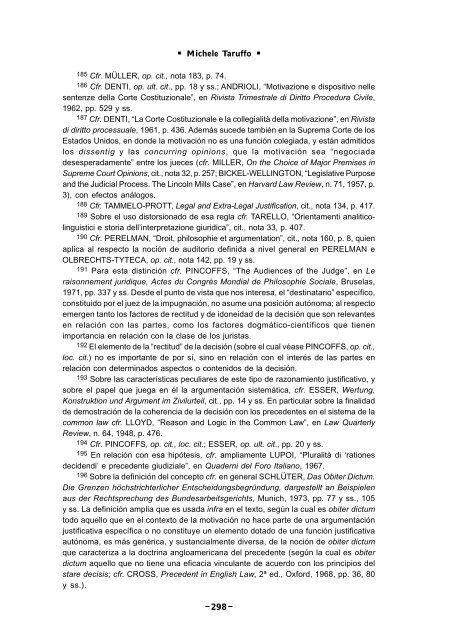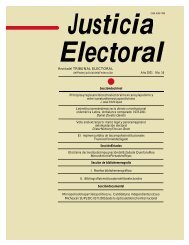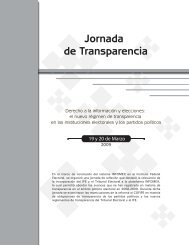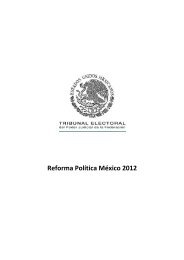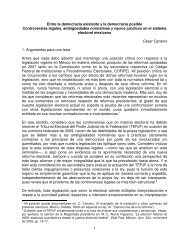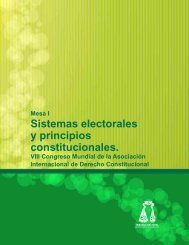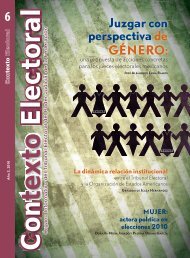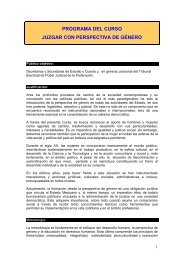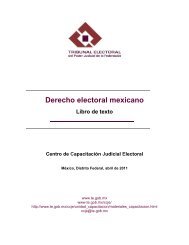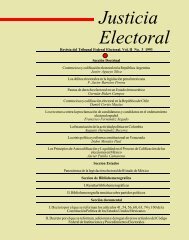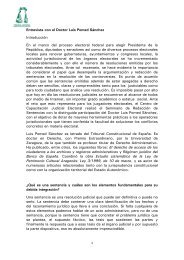La Motivación de la Sentencia Civil - Tribunal Electoral del Poder ...
La Motivación de la Sentencia Civil - Tribunal Electoral del Poder ...
La Motivación de la Sentencia Civil - Tribunal Electoral del Poder ...
You also want an ePaper? Increase the reach of your titles
YUMPU automatically turns print PDFs into web optimized ePapers that Google loves.
Michele Taruffo<br />
185 Cfr. MÜLLER, op. cit., nota 183, p. 74.<br />
186 Cfr. DENTI, op. ult. cit., pp. 18 y ss.; ANDRIOLI, “Motivazione e dispositivo nelle<br />
sentenze <strong>de</strong>l<strong>la</strong> Corte Costituzionale”, en Rivista Trimestrale di Diritto Procedura <strong>Civil</strong>e,<br />
1962, pp. 529 y ss.<br />
187 Cfr. DENTI, “<strong>La</strong> Corte Costituzionale e <strong>la</strong> collegialità <strong>de</strong>l<strong>la</strong> motivazione”, en Rivista<br />
di diritto processuale, 1961, p. 436. A<strong>de</strong>más suce<strong>de</strong> también en <strong>la</strong> Suprema Corte <strong>de</strong> los<br />
Estados Unidos, en don<strong>de</strong> <strong>la</strong> motivación no es una función colegiada, y están admitidos<br />
los dissentig y <strong>la</strong>s concurring opinions, que <strong>la</strong> motivación sea “negociada<br />
<strong>de</strong>sesperadamente” entre los jueces (cfr. MILLER, On the Choice of Major Premises in<br />
Supreme Court Opinions, cit., nota 32, p. 257; BICKEL-WELLINGTON, “Legis<strong>la</strong>tive Purpose<br />
and the Judicial Process. The Lincoln Mills Case”, en Harvard <strong>La</strong>w Review, n. 71, 1957, p.<br />
3), con efectos análogos.<br />
188 Cfr. TAMMELO-PROTT, Legal and Extra-Legal Justification, cit., nota 134, p. 417.<br />
189 Sobre el uso distorsionado <strong>de</strong> esa reg<strong>la</strong> cfr. TARELLO, “Orientamenti analiticolinguistici<br />
e storia <strong>de</strong>ll’interpretazione giuridica”, cit., nota 33, p. 407.<br />
190 Cfr. PERELMAN, “Droit, philosophie et argumentation”, cit., nota 160, p. 8, quien<br />
aplica al respecto <strong>la</strong> noción <strong>de</strong> auditorio <strong>de</strong>finida a nivel general en PERELMAN e<br />
OLBRECHTS-TYTECA, op. cit., nota 142, pp. 19 y ss.<br />
191 Para esta distinción cfr. PINCOFFS, “The Audiences of the Judge”, en Le<br />
raisonnement juridique, Actes du Congrès Mondial <strong>de</strong> Philosophie Sociale, Bruse<strong>la</strong>s,<br />
1971, pp. 337 y ss. Des<strong>de</strong> el punto <strong>de</strong> vista que nos interesa, el “<strong>de</strong>stinatario” específico,<br />
constituido por el juez <strong>de</strong> <strong>la</strong> impugnación, no asume una posición autónoma; al respecto<br />
emergen tanto los factores <strong>de</strong> rectitud y <strong>de</strong> idoneidad <strong>de</strong> <strong>la</strong> <strong>de</strong>cisión que son relevantes<br />
en re<strong>la</strong>ción con <strong>la</strong>s partes, como los factores dogmático-científicos que tienen<br />
importancia en re<strong>la</strong>ción con <strong>la</strong> c<strong>la</strong>se <strong>de</strong> los juristas.<br />
192 El elemento <strong>de</strong> <strong>la</strong> “rectitud” <strong>de</strong> <strong>la</strong> <strong>de</strong>cisión (sobre el cual véase PINCOFFS, op. cit.,<br />
loc. cit.) no es importante <strong>de</strong> por sí, sino en re<strong>la</strong>ción con el interés <strong>de</strong> <strong>la</strong>s partes en<br />
re<strong>la</strong>ción con <strong>de</strong>terminados aspectos o contenidos <strong>de</strong> <strong>la</strong> <strong>de</strong>cisión.<br />
193 Sobre <strong>la</strong>s características peculiares <strong>de</strong> este tipo <strong>de</strong> razonamiento justificativo, y<br />
sobre el papel que juega en él <strong>la</strong> argumentación sistemática, cfr. ESSER, Wertung,<br />
Konstruktion und Argument im Zivilurteil, cit., pp. 14 y ss. En particu<strong>la</strong>r sobre <strong>la</strong> finalidad<br />
<strong>de</strong> <strong>de</strong>mostración <strong>de</strong> <strong>la</strong> coherencia <strong>de</strong> <strong>la</strong> <strong>de</strong>cisión con los prece<strong>de</strong>ntes en el sistema <strong>de</strong> <strong>la</strong><br />
common <strong>la</strong>w cfr. LLOYD, “Reason and Logic in the Common <strong>La</strong>w”, en <strong>La</strong>w Quarterly<br />
Review, n. 64, 1948, p. 476.<br />
194 Cfr. PINCOFFS, op. cit., loc. cit.; ESSER, op. ult. cit., pp. 20 y ss.<br />
195 En re<strong>la</strong>ción con esa hipótesis, cfr. ampliamente LUPOI, “Pluralità di ‘rationes<br />
<strong>de</strong>ci<strong>de</strong>ndi’ e prece<strong>de</strong>nte giudiziale”, en Qua<strong>de</strong>rni <strong>de</strong>l Foro Italiano, 1967.<br />
196 Sobre <strong>la</strong> <strong>de</strong>finición <strong>de</strong>l concepto cfr. en general SCHLÜTER, Das Obiter Dictum.<br />
Die Grenzen höchstrichterlicher Entscheidungsbegründung, dargestellt an Beispielen<br />
aus <strong>de</strong>r Rechtsprechung <strong>de</strong>s Bun<strong>de</strong>sarbeitsgerichts, Munich, 1973, pp. 77 y ss., 105<br />
y ss. <strong>La</strong> <strong>de</strong>finición amplia que es usada infra en el texto, según <strong>la</strong> cual es obiter dictum<br />
todo aquello que en el contexto <strong>de</strong> <strong>la</strong> motivación no hace parte <strong>de</strong> una argumentación<br />
justificativa específica o no constituye un elemento dotado <strong>de</strong> una función justificativa<br />
autónoma, es más genérica, y sustancialmente diversa, <strong>de</strong> <strong>la</strong> noción <strong>de</strong> obiter dictum<br />
que caracteriza a <strong>la</strong> doctrina angloamericana <strong>de</strong>l prece<strong>de</strong>nte (según <strong>la</strong> cual es obiter<br />
dictum aquello que no tiene una eficacia vincu<strong>la</strong>nte <strong>de</strong> acuerdo con los principios <strong>de</strong>l<br />
stare <strong>de</strong>cisis; cfr. CROSS, Prece<strong>de</strong>nt in English <strong>La</strong>w, 2ª ed., Oxford, 1968, pp. 36, 80<br />
y ss.).<br />
298


